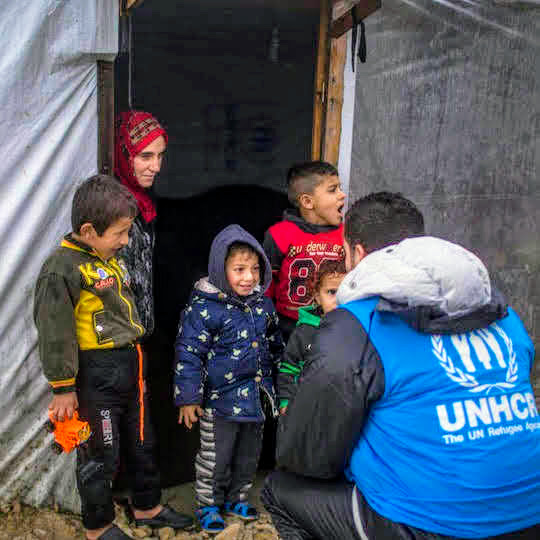Multi-Purpose Cash Assistance: Impact Evaluation on the Well-Being of Syrian Refugees - 2020
Lebanon, 2018 - 2019
Get MicrodataIdentification
CAMEALEON_LBN_2020_MPC_v2.1
Multi-Purpose Cash Assistance: Impact Evaluation on the Well-Being of Syrian Refugees - 2020
| Name | Country code |
|---|---|
| Lebanon | LBN |
Since the onset of the Syrian crisis, the humanitarian community has increasingly relied on cash-based assistance provided from donor contributions and implemented by aid partners under the Lebanon Crisis Response Plan to support the affected population. In November 2017, the World Food Programme (WFP) joined the United Nations High Commissioner for Refugees (UNHCR) and non-governmental organisations (NGO) in the delivery of multi-purpose cash (MPC) to assist the most economically vulnerable Syrian refugee households to meet their basic needs.
This study aims to measure the short-term (12 months or less) and long-term (more than 12 months) causal impact of the $173.50 and $175 MPC assistance provided by WFP and UNHCR respectively, over and above the $27 per person per month assistance, as well as the impact of discontinuation from MPC on the well-being of Syrian refugees. This report presents the causal impact on multiple dimensions of well-being, namely household expenditures, food security, housing, water, sanitation and hygiene (WASH), education, employment, health and decision-making.
The key take-away messages from the study are:
- The impact of MPC materialised across most dimensions of well-being in the long-term, indicating the importance of households' access to a longer duration of MPC.
- The benefits of MPC fade for many indicators within 4 to 10 months after discontinuation, and households' well-being returned to pre-assistance levels for most indicators, and dropped slightly below the pre-assistance baseline for others.
- The findings would suggest that there are benefits to instituting longer cash cycles and/or linking MPC to other services through a 'cash plus' approach to expand and extend the positive impact of cash on beneficiary households and ensure sustainable impact.
A total of 11,457 households were visited and used in this analysis, which constitutes one of the largest samples among impact evaluations conducted in Lebanon to date.
Sample survey data [ssd]
Household and individual.
Scope
The scope includes:
- Household expenditures
- Food security
- Housing and WASH
- Education
- Employment
- Health
- Decision making
| Topic |
|---|
| Health and Nutrition |
| Health |
| Water Sanitation Hygiene |
| Food security |
| Education |
| Cash Assistance |
| Basic Needs |
| Decision making |
Producers and sponsors
| Name |
|---|
| CAMEALEON |
| Name |
|---|
| American University of Beirut |
Sampling
A total of 11,457 households were visited and used in this analysis, which constitutes one of the largest samples among impact evaluations conducted in Lebanon to date. The impact evaluation used a quasi-experimental fuzzy regression discontinuity design, which enables estimation of the causal impact of MPC after different enrolment periods in the programme (rather than producing simple correlations). For this purpose, a multi-sectoral household survey was collected across three regions in Lebanon (Bekaa, North, and Mount Lebanon), where 85 per cent of Syrian refugees and 94 per cent of MPC beneficiaries live, over three waves of data collection held in July/ August 2018, February/March 2019, and July/August 2019. The multiple rounds of data collection allowed for the measurement of effects that materialise at different points in time and enabled the validation of the detected impact. Furthermore, collecting data in the summer and winter made it possible to account for seasonal variations, and accessing administrative data from UNHCR on other assistance programmes targeting the population of interest made it possible to append this information and distinguish between the effect of MPC and other programmes. WFP and UNHCR cash assistance beneficiaries are selected based on a proxy means testing formula that constructs a vulnerability score for each household based on a set of socio-demographic characteristics from the UNHCR database. This score predicts the per capita expenditure level of households and is used to rank them from most to least vulnerable. All households with a score below the SMEB are eligible for MPC. However, due to budgetary constraints, only about 29 per cent of eligible households currently receive the MPC package. WFP follows a bottom-up approach by including in the programme households starting from the lowest scores and moving up the scores until the allocated funding is fully disbursed. UNHCR employs a geographical bottomup targeting approach by including the most vulnerable households in each geographic region until it reaches the regions allocated proportion given its budget constraints. Accordingly, the point at which the funding is fully disbursed creates an artificial cut-off line. This creates a quasi-natural experiment where households on either side of the cut-off are plausibly similar along observable and unobservable characteristics. As a result, the argument is that the only difference is the receipt of MPC. Thus, any differences in outcomes between households are attributable to the amount of cash assistance received, which allows for measuring the causal impact of the MPC. Notably, because the annual recalibration of the targeting formula that determines a households eligibility for MPC occurred prior to the collection of wave 2 data, this uniquely positioned the study to measure the impact of discontinuation on affected household.
Survey instrument
The questionnaire included the following sections: demographics, education, employment, health, food, housing, economic situation, accountability.
Data collection
| Start | End |
|---|---|
| 2018-07-23 | 2019-09-03 |
| Name |
|---|
| Economic Development Solutions |
Data Access
Please cite as follows:
CAMEALEON (2020) Multi-Purpose Cash Assistance in Lebanon: Impact Evaluation on the Well-Being of Syrian Refugees - 2020. Ref. CAMEALEON_LBN_2020_MPC. UNHCR microdata library: https://microdata.unhcr.org
Contacts
| Name | Affiliation | |
|---|---|---|
| Chiara Genovese | CAMEALEON | chiara.genovese@nrc.no |
| Curation team | UNHCR | microdata@unhcr.com |
